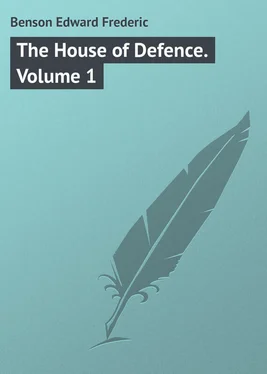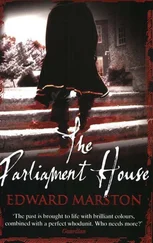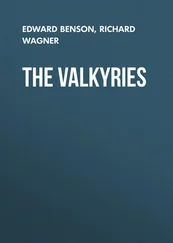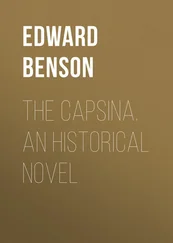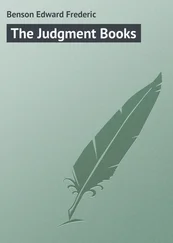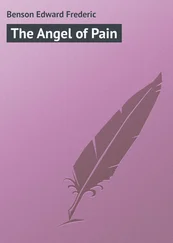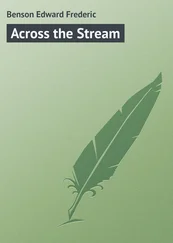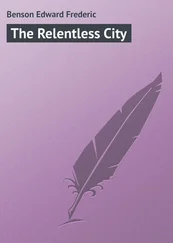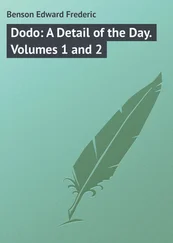Edward Benson - The House of Defence. Volume 1
Здесь есть возможность читать онлайн «Edward Benson - The House of Defence. Volume 1» — ознакомительный отрывок электронной книги совершенно бесплатно, а после прочтения отрывка купить полную версию. В некоторых случаях можно слушать аудио, скачать через торрент в формате fb2 и присутствует краткое содержание. Жанр: foreign_prose, на английском языке. Описание произведения, (предисловие) а так же отзывы посетителей доступны на портале библиотеки ЛибКат.
- Название:The House of Defence. Volume 1
- Автор:
- Жанр:
- Год:неизвестен
- ISBN:нет данных
- Рейтинг книги:3 / 5. Голосов: 1
-
Избранное:Добавить в избранное
- Отзывы:
-
Ваша оценка:
- 60
- 1
- 2
- 3
- 4
- 5
The House of Defence. Volume 1: краткое содержание, описание и аннотация
Предлагаем к чтению аннотацию, описание, краткое содержание или предисловие (зависит от того, что написал сам автор книги «The House of Defence. Volume 1»). Если вы не нашли необходимую информацию о книге — напишите в комментариях, мы постараемся отыскать её.
The House of Defence. Volume 1 — читать онлайн ознакомительный отрывок
Ниже представлен текст книги, разбитый по страницам. Система сохранения места последней прочитанной страницы, позволяет с удобством читать онлайн бесплатно книгу «The House of Defence. Volume 1», без необходимости каждый раз заново искать на чём Вы остановились. Поставьте закладку, и сможете в любой момент перейти на страницу, на которой закончили чтение.
Интервал:
Закладка:
Thurso laughed; sharp though his neuralgia still was, he was already beginning to think of things apart from himself.
“How can you say that?” he asked. “You are bursting to know.”
“Well, yes, I am. Do tell me.”
“I sha’n’t Maud, I think I will change, though it is so late, as I have been in and out of those houses all day. But you needn’t; you can begin without me, if you like.”
Maud put her nose in the air.
“Did you really imagine I was going to wait for you?” she asked.
Thurso went upstairs, still smiling at Maud’s unbridled curiosity, especially since there was no mystery or reason for secrecy about that which he had stopped himself telling her. He merely was not quite sure whether or no he wanted to do that which he had been on the point of proposing, and which in itself was of a perfectly unexciting nature. The bare, dull facts of the matter were these. He had let the salmon-fishing of the river here until the end of July to an American, whose name at the moment he could not remember, and this afternoon, as he came out of one of the cottages, he had passed one of his gillies carrying rod and gaff, and walking with a young man of clearly transatlantic origin, whom he felt sure must be the American in question; and the remark he had refrained from making to Maud was that it might be neighbourly to ask him to dinner. But as he made his hurried toilet, he found himself debating the reasons for and against doing this with a perfectly unaccountable earnestness, as if the decision this way or that was one that could conceivably be of importance. On the one side, the reasons against asking him were that the hospitality they could offer him was of the plainest and most baked-apple kind, served in a shrouded room, and that he would probably get a much better dinner at the inn where he was quartered. Also, he himself felt that if he had come up to Caithness to fish, he would much sooner that his landlord did not ask him to dinner, since his hospitality, if accepted, would mean the curtailment of the cream of the evening rise. So perhaps the truer hospitality would be shown in not burdening his tenant with the necessity of inventing an excuse or of accepting a tiresome invitation. Then suddenly the man’s name, Bertie Cochrane, flashed into his mind. Thurso had thought it so odd to sign a lease by an abbreviated name. In any case, it would be kinder not to ask Mr. Bertie Cochrane to come three miles in order to eat Scotch broth with a tired landlord, who would probably be suffering from severe neuralgia.
But, on the other hand, Thurso felt a perfectly unaccountable desire to see him. He had just met and passed him in the village street, after coming out from one of those fever-stricken cottages where a young stalker of his was lying desperately ill. At the moment he, too, was screwed down to the rack with this hideous unnerving pain, and feeling utterly dispirited and beaten and hopeless. But for half a second his eyes had met Cochrane’s, and just for that half-second – by chance, perhaps, or perhaps by reason of that subtle animal magnetism which some people possess – Thurso had suddenly felt both soothed and encouraged. Maud, he knew, had something of this magnetic quality, and to be with her always braced him to a livelier optimism; but in this case the effect had been magical. There was nothing particularly remarkable about the man: he was rather tall, young, clean-shaven, with a pleasant boyish face that suggested plenty of cold water and open air. That was all, but at the moment Thurso had felt almost inevitably inclined to speak to him and thank him; to tell him how bitterly his head ached and how miserably dispirited he felt; to tell him also that he had made him feel better. The impulse had been quite absurdly strong, but in another moment they had passed, going their respective ways. But all the afternoon, subsequent to that chance encounter, the remembrance of Mr. Cochrane strolling down to the river, and talking in so pleasant and friendly a manner to the gillie, had never been wholly out of his mind. Cochrane had seemed an incarnation of health and contentment, and the other all day had found it scarcely possible to believe in the existence of such qualities, so remote were they from him. Then antagonism to Mr. Cochrane had begun to take root in him: he seemed a millionaire in happiness, leaving pauperism all round him. Well, it was unlikely they would meet again; reasons of hospitality were sufficient for not asking him to accept it.
He finished dressing without any severe return of pain, but just as he was ready to go downstairs it came suddenly back again in such stabs and spasms of anguish that for a moment he held on to his dressing-table with clenched hands, bitten lips, and a dripping forehead. Then his eye fell on the bottle of laudanum which stood by his looking-glass, and though never before had he taken two doses on the same day, yet never before after one dose had he suffered pain so agonising and excruciating as this. But to-day the impulse was incontrollable: he could no longer reason about the expediency of it, and next moment, with shaking hand, he poured a full dose into the graduated glass, and drank it. Those few moments had made him feel faint and sick with pain, and after drinking he sat down to wait for the divine relief that would come so quickly. On his very sensitive and excitable nerves the drug exercised an almost instantaneous effect – not soporific at all, but tranquillising and at the same time immensely stimulating. The pain would fade like the melting away of the vapour of breath on a frosty morning, till it became an incredible memory, while even as it faded a warm tingling glow began to invade him. It was as if after some frost-bitten Arctic night the sun of the South would pour its beams upon his brain; happiness and content would unfold, and, like some magic rose miraculously opening its rosy petals in the luminous peace of a summer morning, a sense of unspeakable well-being would sprawl and blossom over his consciousness.
He had not to wait long: before the seconds on the watch which he had just taken up when the agony seized him had ticked themselves into a minute, the divine remission of pain began, and, increasing as it increased, there came that extraordinary glow of content, so that a couple of minutes afterwards it was not so much in the utter relief of pain that his body revelled as in the ecstasy of this supreme, harmonious sense of health. And then, as always, this spread like some tide of warm incoming waters to his mind. The horror and suffering he had seen that day in the fevered village ceased to weigh upon him and darken him with the sense of his possible responsibility and certain helplessness. Instinctively, his mind ceased to dwell on the thought of the stalker whose life was nearly despaired of, but went to another bedside where a life that had been almost despaired of yesterday had seemed to pause at the very entrance of the valley of the shadow, and had crawled back a little way into life again. The shadow from the valley still lay over it, but its face was set towards the living. Already this divine drug had done that for him: it stopped pain of the mind, it seemed, even as it stopped the torture of an anguished nerve.
He had sat down for a moment to recover from the physical faintness which had seized him at that savage assault of pain, but he had sat down also in order to abandon himself with greater receptiveness to the rapture of the effect that he knew would come with that remission. Then, after a few minutes more, he got up, remembering two things – the first that Maud was probably waiting for him, though she had scorned the notion; the second that this evening for the first time he was consciously revelling and delighting in the bodily and mental sensations that the opium produced, apart from its anodynic qualities. Hitherto he had taken it purely medicinally, sparingly also, in order to relieve pain, when the pain was frankly intolerable, or when it paralysed his power of making exertions that he was clearly called upon to make; and, having taken it like a medicine, he had in intention done no more than profit by the medicinal advantage of its restorative qualities. But to-night he knew, if he honestly looked at the spring of motive, that he had done something different – had drunk with a different desire. True, the pain had been in itself almost demoralising in its intensity, but when he drank he had waited for and desired, not only the remission of that, but the glow of exquisite well-being and that harmony of sensation which the drug gave him. That was even more heavenly than the cessation of the acutest pain.
Читать дальшеИнтервал:
Закладка:
Похожие книги на «The House of Defence. Volume 1»
Представляем Вашему вниманию похожие книги на «The House of Defence. Volume 1» списком для выбора. Мы отобрали схожую по названию и смыслу литературу в надежде предоставить читателям больше вариантов отыскать новые, интересные, ещё непрочитанные произведения.
Обсуждение, отзывы о книге «The House of Defence. Volume 1» и просто собственные мнения читателей. Оставьте ваши комментарии, напишите, что Вы думаете о произведении, его смысле или главных героях. Укажите что конкретно понравилось, а что нет, и почему Вы так считаете.
